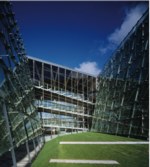Building the intelligent bridge to sustainability

Natural ventilation meets intelligent control — Opening windows to provide natural ventilation is a key part of the environmental strategy of the offices of Kildare County Council at Aras Chill Dara. Their operation is controlled by the building-management system in response to carbon-dioxide levels and temperature, with SE Controls’ OSO controllers opening and closing the windows. To provide occupants with individual control, the system is interfaced with the PC network — so that individual switches are not required on the walls by the windows.
Passive technology alone cannot meet sustainability objectives. Alison Nicholl explains why intelligence-based solutions are also needed.A decade ago the idea of bringing together intelligent and green buildings was seen as ground breaking and controversial. At that time, both intelligent buildings and green buildings were monopolised by two opposing viewpoints. At one extreme those in the green-buildings movement saw, and indeed some still see, technology as the cause of many of the world’s climate and energy problems. Some of the more reactionary environmentalists recently claimed that ‘technology invariably disappoints in terms of performance and durability’ and that people should end their ‘love affair with high technology and gizmos’. Many proponents of low-tech, passive solutions do not see the importance of intelligence-based solutions, preferring to focus exclusively on delivering sustainable buildings through passive structural measures. This purist, sometimes almost religious, view of environmental sustainability leads many people to suspect the whole notion. They are not yet prepared to fundamentally change their lives in order to live ‘more sustainably’. At the opposite extreme is a high-technology faction, which develops and implements technologies and intelligent solutions just for the sake of being high-tech and leading edge. Their solutions are fundamentally technologically driven — and, once again, disenfranchise those looking for mainstream solutions.
Mainstream attention Factors such as increasing energy costs, tightened Building Regulations, media coverage of climate change and corporate social responsibility are bringing environmental sustainability to mainstream attention. As a result, an increasing number of people in the middle ground is prepared to accept that intelligence can — and indeed must — be used to significantly improve building performance in social, economic and environmental terms. Intelligence-based solutions can be used to deliver buildings which meet the requirements of the 21st century, while optimising their environmental performance. There is no mainstream desire to turn against technological progress. Intelligence can be used to measure, manage and control the performance of a building. An optimum integration of active and passive systems can create buildings that are responsive to user needs and deliver performance and value over time. Passive systems most certainly have a place in delivering building performance, but to optimise performance intelligence-based systems are also essential. For example, in buildings where natural daylighting is maximised, there is still a need to provide well managed artificial lighting. The use of intelligent lighting-management systems can ensure that the artificial lighting is optimised in terms of both energy performance and occupant experience. Intelligent sensors and meters can be used to ensure that all building systems are used effectively and deliver to their full potential.
Leadership The UK continues to demonstrate global leadership in acknowledging and addressing the challenges of climate change, particularly through the design and implementation of sustainable solutions that make effective use of intelligent and green building solutions. Unfortunately these successes are rarely recognised. All too often, media coverage concentrates either on failure or on prizes for new buildings which are heavily weighted towards architectural style and design features. Buildings that are using intelligent systems to deliver quality, performance and value over time are very rarely documented and publicised.
Case studies The Centre of Excellence for Intelligence in Buildings (ibexcellence) is currently redressing this balance by working with its partners to produce detailed case studies identifying and quantifying the real value of intelligence-based applications in buildings — thereby showcasing UK leadership in this area. These case studies provide the basis for the Intelligent Bridge to Sustainability, an international programme to capture and communicate proven best-practice in intelligent and green building solutions, thereby raising the standards of performance and design in emerging markets like China and creating major commercial opportunities for progressive suppliers of products, systems and services.
 |
Monodraught Windcatchers used to provide natural ventilation at Fromeside Hospital in Bristol are controlled by the building-management system. To control internal temperature, the Windcatchers start to open at 16°C and by a further 10% for every 1 K rise in temperature. In winter, they are controlled according to carbon-dioxide levels and close to 5% to provide trickle ventilation. |
The challenge that is being addressed by ibexcellence is how to capture this best-practice, prove the benefits that can be achieved and capitalise upon them by moving the solutions into the mainstream — both nationally and internationally — in an effective and profitable manner. A selection of the best of these case studies will be presented at Intelligent & Green 2007, Europe’s leading event for intelligent and green buildings and organised by ibexcellence on 26 and 27 November. This international conference and exhibition will build upon the internationally leadership position established by the UK in intelligent and green buildings. Exemplar case studies of best-practice will be presented and reviewed for commercial buildings and residential developments, while exploring the potential for international opportunities. The very best case-studies will be selected and acknowledged with Intelligent and Green Building of the Year Awards. To find out more about the Intelligent Bridge to Sustainability and Intelligent & Green 2007, contact ibexcellence on ibexcellence@iandi.ltd.uk or call 01923 665950.
Alison Nicholl is a business analyst with I&I Ltd.
Related links:









